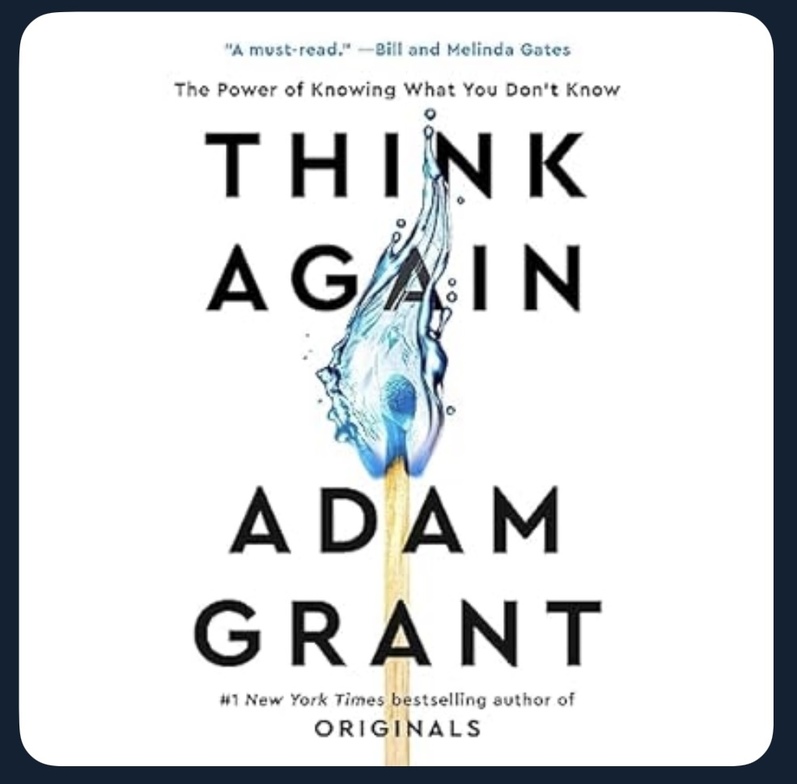
Another amazing book for Ignite Insights this week! I listened to Think Again by Adam Grant on Audible and finished it over a weekend of traveling because I found it so fascinating. What really stood out to me was the idea of approaching conversations like a scientist—constantly gathering information, asking questions, and remaining open to changing your mind. Grant emphasizes how our beliefs and thoughts can be much more fluid than we realize, which really aligns with how I strive to grow.
As someone who consumes a lot of books and podcasts, I can see how this concept of "thinking like a scientist" has already helped me. By hearing different viewpoints and opinions, I’ve become more adaptable and willing to reshape my views when I encounter new insights. It’s an ongoing learning process, but it’s incredibly rewarding! The summary is below. Enjoy!
Adam Grant’s Think Again is a thought-provoking exploration of the importance of rethinking and unlearning in our rapidly changing world. As a psychologist and professor, Grant encourages readers to embrace intellectual humility, challenge their own beliefs, and open themselves up to new perspectives. The book focuses on the power of being flexible in our thinking, questioning our assumptions, and adapting to new information rather than clinging to outdated views.
One of the key concepts in Think Again is Grant’s identification of three types of thinkers: Preachers, Prosecutors, and Politicians. Preachers cling to their beliefs and aim to persuade others to follow them; Prosecutors focus on proving others wrong without reconsidering their own views; and Politicians seek to gain approval from others, adapting their stance based on public opinion. Grant argues that we should aim to think more like Scientists, who are constantly testing their hypotheses, gathering evidence, and adjusting their beliefs based on new findings.
Through engaging stories, research, and personal insights, Grant highlights how rethinking is essential not just for personal growth but also for creating more inclusive, innovative, and collaborative environments. He draws on examples from business, education, and everyday life to demonstrate how individuals and organizations can benefit from continuously updating their knowledge, changing their minds, and embracing the discomfort that comes with questioning long-held beliefs.
This book resonated with me because it challenges the conventional notion that confidence comes from knowing all the answers. Instead, Grant shows that real confidence comes from being willing to admit when we don’t know and being open to learning. Below are some of the key takeaways that stuck with me after reading Think Again:
Key Takeaways:
- Intellectual Humility: Be open to the idea that we may be wrong. Rethinking helps us avoid overconfidence and opens up the possibility of growth.
- The Joy of Being Wrong: Grant encourages us to see being wrong not as a failure but as an opportunity to improve and refine our thinking.
- The Power of “Confident Humility”: Balance confidence with the awareness that there’s always more to learn. Admitting when we don’t know something is a sign of strength, not weakness.
- Challenge Assumptions: Our beliefs should evolve as we gain new experiences and information. Rethinking helps us avoid the trap of sticking to outdated ideas.
- Mental Flexibility: Just as physical flexibility helps us move better, mental flexibility allows us to adapt to new challenges and situations more effectively.
- Learning from Others: Surround yourself with people who challenge your thinking. Diversity of thought is key to innovation and personal growth.
- The Importance of Emotional Intelligence: Grant reminds us that effective rethinking often requires understanding and managing emotions, both in ourselves and others.
- Rethinking in Organizations: Organizations that encourage a culture of learning and rethinking are more likely to innovate and succeed in the long run.
- The Scientist Mindset: Approach life like a scientist—constantly test hypotheses, gather evidence, and be willing to revise your conclusions.
In a world that is constantly evolving, Think Again offers a powerful reminder that adapting and questioning our perspectives is not just valuable—it’s necessary. It’s a call to embrace the discomfort of uncertainty and to see rethinking as a critical skill for thriving in both our personal and professional lives.

Jill Saban
Contact Me



